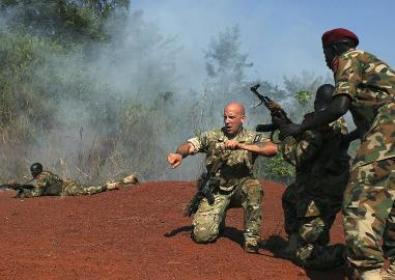US to withdraw military aid to S. Sudan as tension escalates
February 28, 2014 (JUBA) – The United States has reportedly taken a decision to withhold its military aid to war-torn South Sudan, despite officials in the new nation saying it had not been notified about the new development.

“There is no official communication that I know from the government of the United States notifying the government of the Republic of South Sudan about its decision to withhold any assistance,” said Mawien Makol.
The official was reacting to reports that President Barak Obama’s administration had decided to withhold military aid to the new nation and transfer some of that money to the Intergovernmental Authority on Development (IGAD) in support of the ceasefire monitoring efforts.
Several officials and activists as well as experts on South Sudan and Sudan testified on Wednesday before the congress that the current developing political and security situation in the two countries require immediate attentions and actions through strong engagements.
Ambassador Donald Booth declared in testimony to a House of Representatives panel that “business as usual” must cease in the case of strife-torn South Sudan.
“As one sign of this”, he said, “I would note that our security assistance to South Sudan is not going forward at this time, and that some of it is being re-programmed to support the regional verification mission.”
The top US envoy did not, however, specify the amount of US funding being transferred to the ceasefire monitoring and verification initiative being carried out by IGAD, a regional bloc that consists of Sudan, Ethiopia, Kenya, Uganda, Djibouti and Somalia as its seven founding members. Eritrea was admitted in 1993, but was suspended in 2007.
South Sudan, which seceded from Sudan in 2011, became an IGAD member the same year it joined the United Nations and African Union bodies.
The envoy also did not indicate how much funding for South Sudan’s army and police is being withheld by the US, though the research arm of the US Congress notes that aid to South Sudan’s security sector has totaled more than $300 million during the past 10 years.
In his remarks on Wednesday, Ambassador Booth criticised the performance of South Sudan government, pointing out authorities in Juba “attempted to contain inter-communal violence without fully committing to the hard work of addressing its causes, which include trauma from decades of war, economic disparity, historical grievances between communities, human rights abuses, and political grievances due to real or perceived under-representation.”
“On top of this”, Booth noted, “the government had also progressively reduced the space for political competition, within and outside the ruling party, and for independent media and civil society voices to be heard.”
He endorsed the efforts by IIGAD, which is presently mediating the talks between the government and the rebels, who defected in mid-December, to try to resolve the conflict in the youngest nation.
“Their premise, one with which I agree, is that the government must not be given the space to return to business as usual with a quick fix and political accommodations for the main protagonists, for the simple reason that this will not bring about a sustainable peace”.
Meanwhile, John Prendergast, a leading US human and civil rights activist, also testified before the House Subcommittee on Africa, Global Health, Global Human Rights, and International Organizations on the developing situation Sudan and South Sudan.
Prendergast is a Co-founder of the Enough Project, an advocacy group which aims to prevent, war and crimes against humanity as well as genocide. He told the hearing that mass atrocities, war crimes and crimes against humanity are being committed in both countries under the cover of war.
“Although the headlines for the last two months have been dominated by conflagration in South Sudan, conditions in Sudan’s Darfur region have deteriorated, and the [Sudanese] government’s bombing campaigns have intensified in the Nuba Mountains and Blue Nile”, he said.
“The potential for a complete interruption in oil production threatens economies in both countries with implosion and bankruptcy. Conflict has interrupted the planting season, and with the rainy season fast approaching, humanitarian crises are spiraling out of control in both countries,” added the activist.
Prendergast argued the US government to consider targeted sanctions as one instrument to create some accountability for the commission of war crimes and undermining of peace efforts.
“The African Union has already put targeted sanctions on the table for South Sudan, and the US should do so as well. If the UN Security Council is not amenable to utilizing this tool, the US should work with interested countries to deploy them in coalition with others”, he said.
Prendergast visited the South Sudanese capital, Juba and Bor one of the areas most affected by the conflict at the beginning of February.
(ST)
